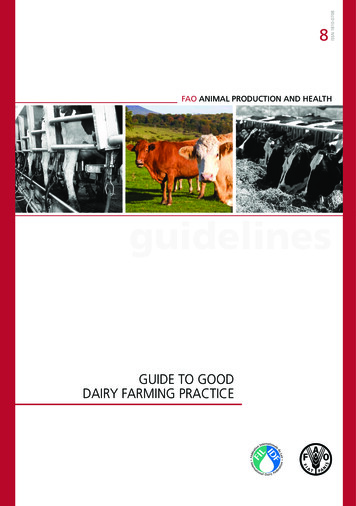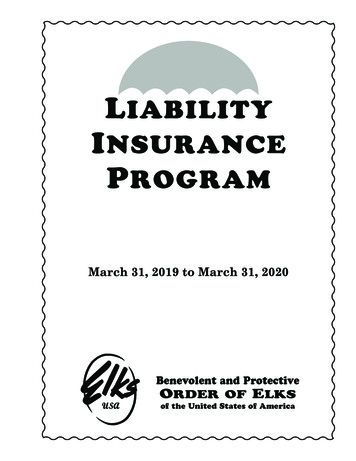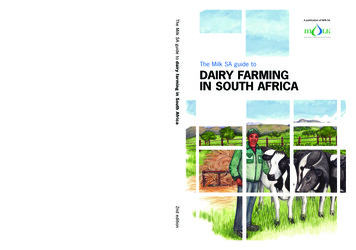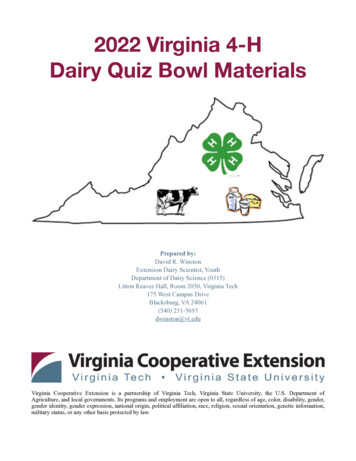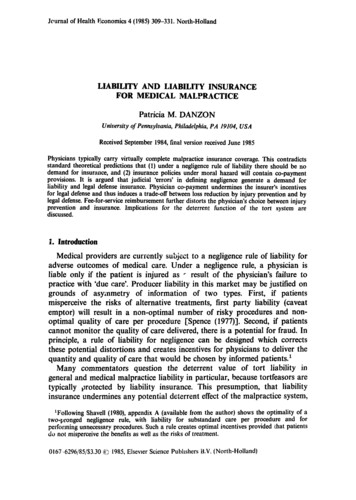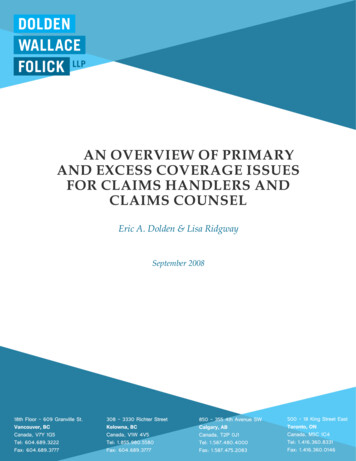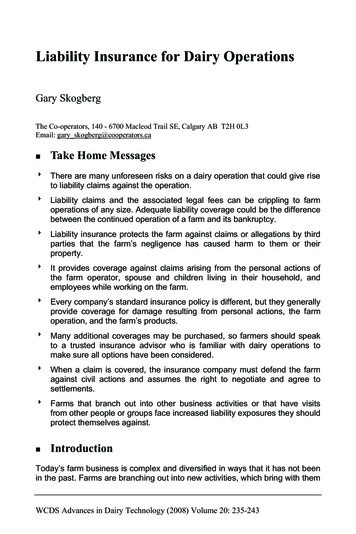
Transcription
Liability Insurance for Dairy OperationsGary SkogbergThe Co-operators, 140 - 6700 Macleod Trail SE, Calgary AB T2H 0L3Email: gary skogberg@cooperators.ca Take Home MessagesThere are many unforeseen risks on a dairy operation that could give riseto liability claims against the operation.Liability claims and the associated legal fees can be crippling to farmoperations of any size. Adequate liability coverage could be the differencebetween the continued operation of a farm and its bankruptcy.Liability insurance protects the farm against claims or allegations by thirdparties that the farm’s negligence has caused harm to them or theirproperty.It provides coverage against claims arising from the personal actions ofthe farm operator, spouse and children living in their household, andemployees while working on the farm.Every company’s standard insurance policy is different, but they generallyprovide coverage for damage resulting from personal actions, the farmoperation, and the farm’s products.Many additional coverages may be purchased, so farmers should speakto a trusted insurance advisor who is familiar with dairy operations tomake sure all options have been considered.When a claim is covered, the insurance company must defend the farmagainst civil actions and assumes the right to negotiate and agree tosettlements.Farms that branch out into other business activities or that have visitsfrom other people or groups face increased liability exposures they shouldprotect themselves against. IntroductionToday’s farm business is complex and diversified in ways that it has not beenin the past. Farms are branching out into new activities, which bring with themWCDS Advances in Dairy Technology (2008) Volume 20: 235-243
236Skogbergnew opportunities and new risks. No longer as isolated from the public as theyonce were, today’s farms have more need for comprehensive liabilityprotection than ever before.Liability insurance protects the farm operation against claims or allegations by“third parties” that the business has caused harm to them or their propertydue to the farm’s negligence. A “third party” is anyone outside the contractbetween the farm operation and the insurance company. Claims of this sortare on the rise in Canada, and every business needs to protect itself againstthem. Liability claims sometimes involve the unforeseen or unknown.Serious liability claims can involve complex legal issues, including costly legalbills and lengthy court proceedings. The insurance company provides thelawyers and legal expertise. A liability policy pays for the legal costs related toclaims. These costs are paid over and above the liability limits of the policy.Farms present a unique challenge for insurance, which covers both the farmoperation and the farm dwellings. Farm liability insurance generally providescoverage to the farm operator, spouse and children living in their household,and employees while working for the farm. A liability policy binds theinsurance company to defend the insured farm against civil actions andassumes the right to make negotiations and settlements it deems expedient. Standard Coverages in Farm Insurance PoliciesFarm insurance policies differ from one company to another, but theygenerally include personal liability, farm operations liability, and farm productsliability, as well as tenants legal liability, non-owned auto liability, andcontingent employers’ liability. These coverages are described below. Personal LiabilityMost farms include a farm residence, or “dwelling.” Farm liability insures thepersonal actions of the farm owner and family members against claims arisingfrom that residence. For example, if someone visiting a residence on a farmfor personal reasons slips and falls injuring himself or herself, the farmercould be held liable under what is known as Occupiers Liability if he or shewas negligent in maintaining the residential property. Negligence couldinclude failing to properly clear snow and ice in the winter, not repairingbroken stairs, and so on. The homeowner/farmer has an obligation tomaintain the premises in safe condition for people who visit the premises.
Liability Insurance for Dairy Operations 237Farm Operations LiabilityFarm liability insures against the legal liability arising from normal farmingoperations. It insures people who come onto the farm who are not membersof the farmers’ family or employed in the operation of the farm. Following aresome examples of exposures that might exist for dairy farmers. Some of theexamples are real; some examples are a spin off of actual losses.The trucker who collects the milk from a farm is injured when he slips onice that should have been cleared before the truck’s arrival. He sustainssevere multiple fractures in his leg, spends several weeks in hospital,goes through several months of therapy and is no longer able to earn aliving as a truck driver due to the severity of the break. He sues the farmfor the injuries sustained, including lost wages for time off work, uninsuredmedical expenses, pain and suffering and for future earnings he will notearn as a truck driver. He is 30 years of age and could have earned aliving driving trucks for another 35 years. The farm could be liable forhundreds of thousands of dollars plus the legal costs.A primary school class visits a farm to learn how a dairy operation runs.One of the visiting children is kicked in the head by a cow, or falls from ahayride the farmer has kindly arranged, and sustains severe braindamage. The child ends up in a vegetative state requiring years ofexpensive future medical care. The child’s family sues the farm for painand suffering, current and future medical expenses, as well as huge legalexpenses and court costs.A cow or horse escapes from a farm property through an open gate orbroken fence and wanders onto the road. A school bus full of childrenstrikes the animal causing the bus to crash. One child is killed and severalare severely injured, requiring lengthy and expensive hospital care. Thecost to defend the claim and pay for the injuries and legal fees couldbankrupt the average farmer. The farm liability policy will protect thefarmer for this type of claim.Many farms operate bed and breakfast businesses to earn some extracash. If a guest is injured by farm equipment or is kicked by a cow, he orshe could sue for their injuries.A diseased animal could be accidentally exposed to a neighbour’slivestock, or could be taken to a county fair where it infects a number ofanimals resulting in large property damage claims against the farmer. Thefarm policy will protect the farmer against any resulting lawsuits.Farm machinery – tractors, trailers, bailers, swathers and combines –occasionally must be moved to an adjacent field or to a neighbour’s place.A family enjoying an afternoon drive and not familiar with the country roadcrashes into the equipment causing serious injuries. Farm equipment that
238Skogbergis not licensed and becomes involved in an accident on a country road orhighway is not insured by an auto policy but it is covered by a farm liabilitypolicy.None of these scenarios could have reasonably been foreseen, and eachcould be so costly as to jeopardize the future of many farm operations.Liability protection could be the difference between the continued operation ofa farm and bankruptcy. Farm Products LiabilityProducts liability insures against claims for bodily injury or property damage tothird parties arising out of an insured farm’s products. Examples of the typesof claims that could, and do arise are:Diseased animals sold to a feed lot or to another farm could cause otheranimals to become sick. The farm liability policy would defend claimsarising from these types of problems.Years ago a chemical known as DES was prescribed to pregnant womento help prevent morning sickness. The same chemical was fed to cattle toincrease weight. The drug was linked to cancer of the uterus in the firstgeneration female children of the women who took the drug. The drugcompany who produced it paid millions of dollars in claims to the affectedwomen. Feed given to a herd often contains drugs, antibiotics or vitamins.It is possible that what we believe today to be safe drugs and vitaminscould be found to be harmful in the future, in the same manner that DESwas. A class action suit would no doubt be commenced on behalf of theinjured people, possibly implicating the dairy farmers who used theenhanced feed, with the statement of claim stating that they should haveknown the drug was unsafe. The farm liability policy should provideprotection against what would certainly be an expensive and lengthy legalaction. Tenants Legal LiabilityTenants legal liability coverage protects the farmer against claims related todamage to rented property. For example, a farmer may rent a residence orspace in a neighbour’s outbuilding to store a tractor. If that property isdamaged by fire caused by a short circuit in the tractor’s electrical system, thetenant’s legal liability coverage will provide compensation for the damage tothe rented property.
Liability Insurance for Dairy Operations 239Non-Owned Automobile LiabilityAs the name implies, non-owned auto liability coverage covers third partyliability claims for bodily injury or property damage arising from the use oroperation of a vehicle that is not owned by the insured farm. Farmers whorent or lease vehicles should carry this coverage. Additional CoveragesThe coverages listed above are generally provided by various companies’standard farm insurance policies. But consideration should be given toadditional risks any particular farm operation presents. The following aresome of the additional coverages that may be purchased for an additionalpremium. Employers LiabilityIn most provinces dairy farmers have the option of insuring their employeesunder provincial workers’ compensation (WCB). The benefits of insuringemployees under WCB are:all employees are covered;it is “no fault” coverage, which means it is not necessary to prove fault forclaims for injury;benefits are immediate;WCB pays for medical care expenses and provides rehabilitation; andin the event of a fatality, WCB pays funeral expenses and survivorbenefits to eligible dependents.If a farmer decides to opt out of the provincial government’s workers’compensation system, Employers’ Liability coverage is available to insurefarm employees for claims arising from injuries to the employees deemed tobe the result of a farmer’s negligence. Employers’ Liability is not as broad asWCB coverage, nor are payments made as quickly. Employee’s Voluntary CompensationSome policies provide limited “weekly indemnity” benefits as an extension toEmployers’ Liability to pay for a portion of an injured employee’s wages.Coverage may also provide accidental loss of life benefits, and temporary or
240Skogbergpermanent disability benefits. Limited Pollution Liability InsuranceSome farm liability policies provide insurance for bodily injury, as well asproperty damage and clean-up costs arising from “pollution incidents,” whichare defined as unexpected and unintentional discharges of pollutants. Thisprovides liability coverage if the farmer causes environmental damage to thirdparty property, or injury to others resulting from the release of a pollutant.Dairy farms use Slurry Tanks or Lagoons to collect waste produced by cows.If the Slurry tank bursts or leaks, or if a Lagoon leaks, the waste could seepinto the ground and ultimately into the water table contaminating the watersupply for surrounding neighbours. The liability policy could insure the cost toclean up the contamination and possible legal action that might arise from theresulting pollution.The policy can be extended to include “on-site clean up costs” the insuredfarm incurs to clean up the pollution spilled on its own property. Other Liability ExposuresFarm liability policies may limit or restrict coverage for certain exposures.Every policy is different, so it is very important to review the details and verifythat the coverages and limits are fully understood. If there are anyuncertainties, the agent or broker should be contacted to clarify the detailsand ensure the insured farm has the desired coverages. Spray Drift Liability from Application of PesticidesMany farmers spray pesticides or other chemicals on their crops. Farm liabilitypolicies may offer insurance for liability claims arising from the application ofpesticides or chemicals that are released or escape from the farmer’sproperty and damage others’ property or animals. Damage to the farmer’sown property is not insured against this peril. Most policies exclude coveragefor damage resulting from the application of pesticides by aircraft. Custom Farming“Custom farming” is defined for insurance purposes as the use of farmmachinery or equipment away from the farmer’s premises, for example whenfarming is being performed for others. As farmers are well aware, their
Liability Insurance for Dairy Operations241equipment is very expensive to buy and operate. Many farmers shareequipment to harvest their own and neighbouring crops, or do harvesting forother farmers. Liability claims can arise if others are injured or property isdamaged during the operation of farm equipment. Most farm policies insureliability arising from custom farming, but coverage may be limited based onseveral thousand dollars of receipts derived from the custom farming. Typicalfarm policies in Canada insure custom farming up to 2,000 in annual grossreceipts. The coverage might also be restricted to losses that occur withinCanada. An agent or broker should be contacted to determine whetherpolicies can be extended for an additional premium to insure larger operationsor to include U.S. operations. Business PursuitsIt is important to be aware that farm liability policies are generally restricted tothe business of farming. Farmers who engage in business pursuits beyondtheir normal farming activities should check their policy and contact theiragent or broker to arrange separate, additional insurance related to thoseadditional activities. For example, some farmers clear their neighbours’ snowin winter for a small fee. Any liability claims arising from this activity would notbe insured by the farm liability policy. Operating a bed & breakfast from thefarm is not considered normal farming activities and may require separateinsurance. Oil and Gas Wells on the FarmIt is not uncommon for western farmers to have oil or gas wells on theirproperty. Farmers may be contracted to clear snow in winter, cut grass insummer or take readings from equipment. The farm liability policy will notcover these activities, which are outside the scope of normal farming activity.Oil and gas companies are responsible for any claims arising from the wellsor pipelines on a farmer’s property. WatercraftMost farm liability policies insure liability arising from the ownership oroperation of small watercraft. The policy should be checked for details; if thefarm liability policy does not insure the watercraft, this coverage should bepurchased separately.
242 SkogbergMotorized Vehicles and Recreational VehiclesFarm liability policies may cover liability arising from the operation of smallunlicensed motor vehicles or recreational vehicles such as snowmobiles,ATV’s and dirt bikes. It is important to note that the liability will not apply topassengers carried on or riding on these vehicles. Therefore, if the farmowner or a family member drives one of these vehicles and is carrying apassenger there is no liability coverage for the passenger if they are injuredduring the operation of that vehicle. Furthermore, if the vehicle drives onto apublic road or highway, the farm liability policy will not apply. Licensedvehicles must be insured on an auto insurance policy. Policies should bechecked for details. Auto LiabilityAutomobile liability insurance is an important consideration. Auto policies onlyinsure licensed vehicles such as family vehicles, farm trucks, possibly tractorsand as mentioned above, motorized recreational vehicles such as ATV’s andsnowmobiles if they are used to carry passengers or if they are used on publicroads. Farmers operate a wide variety of equipment beyond these vehicles,including tractors, combines, swathers, and bailers to name a few. Asmentioned previously, vehicles or equipment that are not required to belicensed or insured by a motor vehicle policy can be insured under a farmliability policy to protect against liability claims resulting from their use. Umbrella LiabilityOften farmers will want to increase the limits to which they are insured understandard liability policies. Umbrella liability coverage can be purchased for thispurpose. Umbrella policies usually require the primary farm and auto policiesto have limits of 1,000,000 or 2,000,000. Umbrella limits are commonly upto 5,000,000 or higher for larger operations. LimitsIt is difficult to advise what adequate liability limits are because of theunpredictability of incidents and ensuing legal proceedings. Most farms willnever be involved in a liability claim, but every one faces the potential for anunforeseen accident resulting in claims well beyond the operation’s financialcapacity.The larger the farm operation, the more potential exists for large claims, so
Liability Insurance for Dairy Operations243large farms should consider carrying higher liability limits. Limits of 2,000,000 are common, and it is possible to purchase 5,000,000 limits ormore for relatively little additional cost.Every farmer should talk to a trusted insurance advisor who understands dairyfarm operations to make sure their family, investments and livelihood areproperly protected. Referenceshttp://www.cooperators.ca/en/farm/5 1 0.html)http://www.ibc.caFact Sheet: Farm Business Insurance" Ontario Ministry of Agriculture, Foodand Rural Affairs, cts/00-041.htm
Farm insurance policies differ from one company to another, but they generally include personal liability, farm operations liability, and farm products liability, as well as tenants legal liability, non-owned auto liability, and contingent employers' liability. These coverages are described below. Personal Liability
